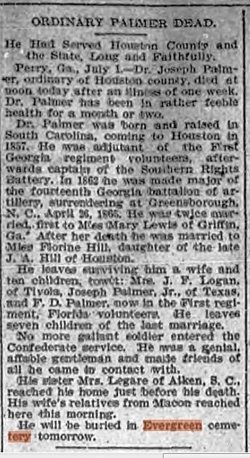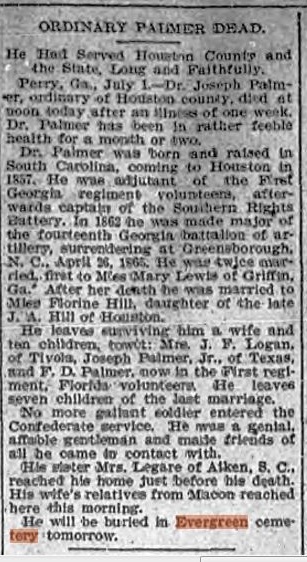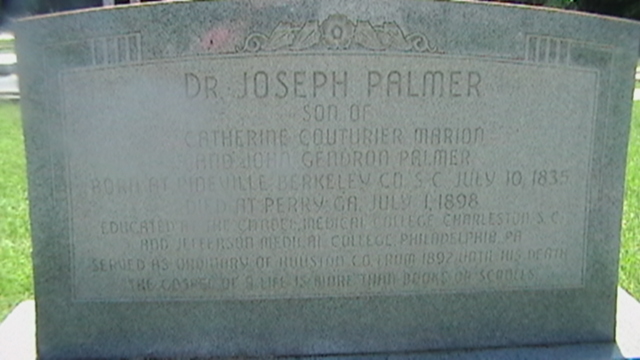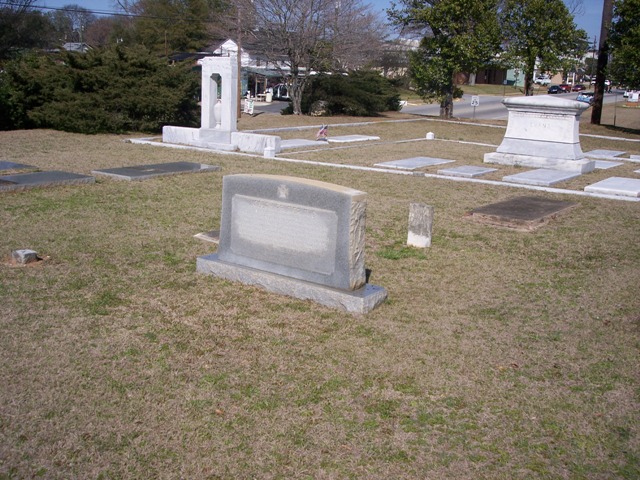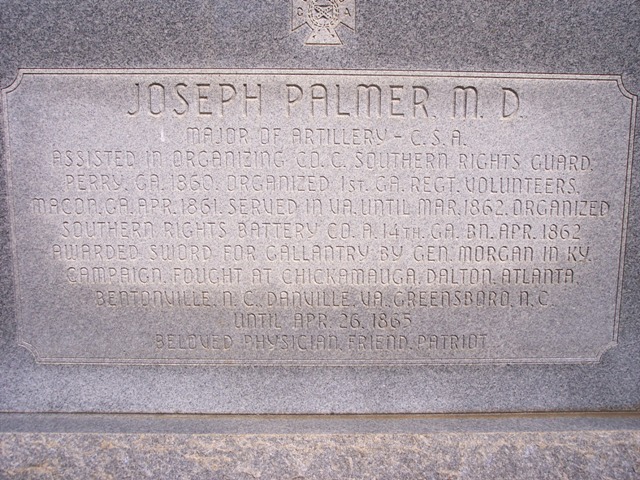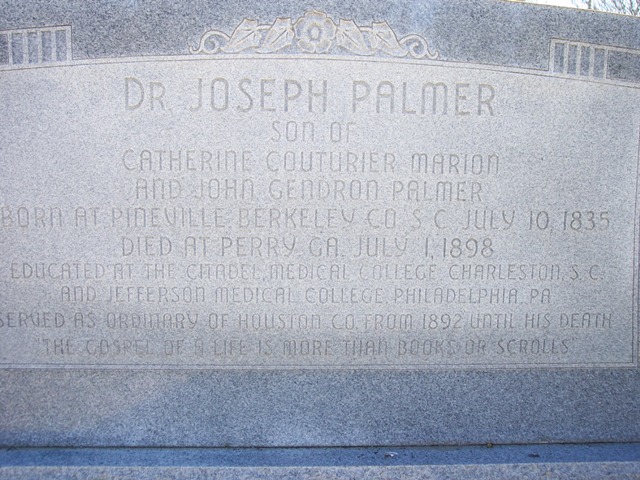Joseph Palmer's growing up years were spent in Charleston where he received his education. After graduating from The Citadel, he decided that he wanted to be a doctor, and in preparation for this he took two courses of lectures at the Medical College in Charleston, then attended Jefferson Medical College in Philadelphia, and had his internship at Bellevue Hospital in New York. When he came back home, in 1858, he showed that he was a man of vision by migrating to Georgia, where he bought several hundred acres of land in Houston County, about where Clinchfield is now.
There he built a house and he called his place Marl Crest ....
Two years after he came to Georgia, to quote the old records, "Dr. Palmer, as a South Carolinian, early became impatient of Northern interference with the South, and having had military training, was one of the first to begin active preparation for the conflict."
In the fall of 1860, he helped to organize the Southern Rights Guards, which company became a part of the First Georgia Volunteers and of which he was First Lieutenant. On the organization of the regiment in March, 1861, he was made Adjutant in which position he served until April, 1862. The regiment was accepted into service by Gov. Joseph E. Brown on March 18, 1861. They reported to Camp Oglethorpe in Macon, the first day of April 1861, and from there they were ordered to Pensacola, Florida. On June 1st, the regiment was ordered to Richmond, Virginia, where it was assigned to General Garnett's command then stationed at Laurel Hill, where they remained until July 11th, 1861, when they evacuated their position and retreated through Maryland, arriving at Monterey, Virginia July 29th, having marched 218 miles. At Monterey they were assigned to Gen. Henry H. Jackson's Brigade, with whom they fought the battle of Green Brier, Oct. 2nd, 1861.
From there they were ordered to Winchester, VA, where they reported to Gen. Stonewall Jackson on December 1st, 1861. They stayed in winter quarters until February 1st, 1862, during which time they were getting ready to participate in Jackson's famous Valley Campaign, when they were ordered back to Georgia by Gov. Brown.
For some obscure reason they had enlisted for a year, their year was up, and Gov. Brown refused the request of the Army of Virginia to let them continue there, and they came back to Georgia via Augusta, where they were disbanded, March 14th, 1862.
As the Confederate Government needed artillery badly, Joseph Palmer and many others, organized a new company, the Southern Rights Battery which became Company A of the 14th Georgia Battalion Light Artillery. Joseph Palmer was elected captain of this company and the Battalion was ordered to join Gen. Braxton Bragg's Army in Chattanooga, Tenn. At the battle of Perryville, Ky., Capt. Palmer was promoted to Major and helped organize Bragg's Reserve Artillery which served under Generals Breckinridge, Cheatham, Hindman, and Hardee. With this brigade, he was with Gen. John Morgan in his thrilling raid into the Yankee lines, capturing and paroling 3,000 prisoners, destroying the railroad to within seventeen miles of Louisville, and reaching McMinnville, Tenn. in safety.
During that famous raid, they fought nine battles and traveled 1,000 miles in fifteen days.
At the battle of Elizabethtown, Ky., Gen. Morgan presented Major Palmer with a sword captured from a Col. Smith, a Federal officer........
Later, when Gen. Joseph E. Johnston was put in command, Maj. Palmer commanded Johnston's Reserve Artillery in the campaign from Dalton to Atlanta, and they were engaged in the battles of Mill Creek Gap, Resaca, New Hope Church, Pine Mountain, Kennesaw Mountain, Pea Ridge, Atlanta, and Jonesboro. The latter battles were fought under Gen. Hood's orders, but when Gen. Johnston was restored to command, my father as senior artillery officer was sent with the Army of Tenn. to Bentonville, N. C., in the attempt to cut Sherman off from his effort to join Grant.
From Bentonville they were ordered to Danville, Va., which they held until Johnston could bring his forces up from Raleigh, N. C., when they were ordered to Greensboro, where they were with Johnston when he surrendered to Sherman.
All of them had to sign the oath of allegiance, which took about a week, and each of the defeated veterans was given ten days rations, and each was allowed to keep his horse, if any, and his side arms. It was not until May 3rd that the Army of Tennessee started its homeward march.
...the Georgia veterans marched through Charlotte, N. C., York, Union, and Huntersville in S. C., and on to Lincolnton, Camak, Sparta, and Milledgeville to Macon, in Georgia. The line of march was found in a small notebook carried in Major Palmer's pocket.
My father returned to Marl Crest in Houston County and to his family there, for he had married Mary Lewis of Forsyth in 1864. She died in 1880, leaving three children.
He was a much needed doctor in the community and was ever a friend of humanity, never failing to answer to the call of the sick and the suffering. He believed it the duty of every man to serve his community in politics and in every way for the best interest of the people. Because of his activities in national and local politics, he was elected chairman of the Democratic Executive committee of Houston County, Georgia, when it was organized after the war, which postion he held by unanimous vote until his death. He organized the Camp of Confederate Veterans in Houston County and was elected Commander and held this position until his death.
One of the best things that he did was to organize the Idle Wylde Club, a social and agricultural club near Wellston, where they built a large two story club house on land donated by Mr. Henry S. Fagin......
He helped to raise the funds for the Confederate Monument, which was erected after his death when the work of raising the funds was taken over by the Clinton C. Duncan Chapter of the U. D. C.
He married my mother, Florine Hill, daughter of Maria Goode Holt and James Augustus Hill of Perry, March 26th, 1887. He was twenty-one years older than she, a widower with three children, and she wanted to be nobody's stepmother, but she loved him, and as he used to tell her, after wearing out six buggies and three horses courting her, she finally consented to marry him, and they went to Marl Crest to live.
In 1892, a group of citizens from Perry and other parts of the country (sic) came and begged him to run for ordinary of the county, which position had been held for years by a right, and they felt that he would be the only person with enough popular appeal as well as ability and character to defeat the incumbents. He finally consented, was elected by a big majority, and we moved to Perry just in time for me to go to school. He was re-elected in 1896, and was ordinary until he died July 1st, 1898, nine days before his sixty-third birthday.
.......
The Perry Home Journal had this to say about my father:
'As a citizen, physician, soldier, public officer, husband, and friend, he was true and faithful under all circumstances and conditions. A consistent member of the Episcopal Church, his deportment was in accord with his profession. As a moneygetter and a money keeper, he was not a success, but as an honest man, a gentleman whose heart and conscience were ever true to the noble dictates of a lofty humanity, he was incomparably a success. The world is better that Dr. Palmer lived in it.'
..........
He was a devout Christian and a loyal Episcopalian, but in Perry there was no Episcopal Church, so he joined the Methodist (Church) with my mother (Extracting from her a promise, however, that if she ever lived where there was an Episcopal Church, she would bring their children up in it). In- spite of this loyalty, he supported the Methodist Church with all the energy and zeal of his nature, just as though it were the church of his choice.
He believed with all his heart in the righteousness of the cause for which he fought, but when the end came, he immediately settled back in the community and with all the charm of his personality and his great ability as a leader, he did all that he could to make the adjustments of his community to changing conditions as smooth as possible.
Maria Palmer Hertwig
taken from the website: http://www.thebriarpatch.com/wbts/havis/palmer.html all rights reserved.
Joseph Palmer's growing up years were spent in Charleston where he received his education. After graduating from The Citadel, he decided that he wanted to be a doctor, and in preparation for this he took two courses of lectures at the Medical College in Charleston, then attended Jefferson Medical College in Philadelphia, and had his internship at Bellevue Hospital in New York. When he came back home, in 1858, he showed that he was a man of vision by migrating to Georgia, where he bought several hundred acres of land in Houston County, about where Clinchfield is now.
There he built a house and he called his place Marl Crest ....
Two years after he came to Georgia, to quote the old records, "Dr. Palmer, as a South Carolinian, early became impatient of Northern interference with the South, and having had military training, was one of the first to begin active preparation for the conflict."
In the fall of 1860, he helped to organize the Southern Rights Guards, which company became a part of the First Georgia Volunteers and of which he was First Lieutenant. On the organization of the regiment in March, 1861, he was made Adjutant in which position he served until April, 1862. The regiment was accepted into service by Gov. Joseph E. Brown on March 18, 1861. They reported to Camp Oglethorpe in Macon, the first day of April 1861, and from there they were ordered to Pensacola, Florida. On June 1st, the regiment was ordered to Richmond, Virginia, where it was assigned to General Garnett's command then stationed at Laurel Hill, where they remained until July 11th, 1861, when they evacuated their position and retreated through Maryland, arriving at Monterey, Virginia July 29th, having marched 218 miles. At Monterey they were assigned to Gen. Henry H. Jackson's Brigade, with whom they fought the battle of Green Brier, Oct. 2nd, 1861.
From there they were ordered to Winchester, VA, where they reported to Gen. Stonewall Jackson on December 1st, 1861. They stayed in winter quarters until February 1st, 1862, during which time they were getting ready to participate in Jackson's famous Valley Campaign, when they were ordered back to Georgia by Gov. Brown.
For some obscure reason they had enlisted for a year, their year was up, and Gov. Brown refused the request of the Army of Virginia to let them continue there, and they came back to Georgia via Augusta, where they were disbanded, March 14th, 1862.
As the Confederate Government needed artillery badly, Joseph Palmer and many others, organized a new company, the Southern Rights Battery which became Company A of the 14th Georgia Battalion Light Artillery. Joseph Palmer was elected captain of this company and the Battalion was ordered to join Gen. Braxton Bragg's Army in Chattanooga, Tenn. At the battle of Perryville, Ky., Capt. Palmer was promoted to Major and helped organize Bragg's Reserve Artillery which served under Generals Breckinridge, Cheatham, Hindman, and Hardee. With this brigade, he was with Gen. John Morgan in his thrilling raid into the Yankee lines, capturing and paroling 3,000 prisoners, destroying the railroad to within seventeen miles of Louisville, and reaching McMinnville, Tenn. in safety.
During that famous raid, they fought nine battles and traveled 1,000 miles in fifteen days.
At the battle of Elizabethtown, Ky., Gen. Morgan presented Major Palmer with a sword captured from a Col. Smith, a Federal officer........
Later, when Gen. Joseph E. Johnston was put in command, Maj. Palmer commanded Johnston's Reserve Artillery in the campaign from Dalton to Atlanta, and they were engaged in the battles of Mill Creek Gap, Resaca, New Hope Church, Pine Mountain, Kennesaw Mountain, Pea Ridge, Atlanta, and Jonesboro. The latter battles were fought under Gen. Hood's orders, but when Gen. Johnston was restored to command, my father as senior artillery officer was sent with the Army of Tenn. to Bentonville, N. C., in the attempt to cut Sherman off from his effort to join Grant.
From Bentonville they were ordered to Danville, Va., which they held until Johnston could bring his forces up from Raleigh, N. C., when they were ordered to Greensboro, where they were with Johnston when he surrendered to Sherman.
All of them had to sign the oath of allegiance, which took about a week, and each of the defeated veterans was given ten days rations, and each was allowed to keep his horse, if any, and his side arms. It was not until May 3rd that the Army of Tennessee started its homeward march.
...the Georgia veterans marched through Charlotte, N. C., York, Union, and Huntersville in S. C., and on to Lincolnton, Camak, Sparta, and Milledgeville to Macon, in Georgia. The line of march was found in a small notebook carried in Major Palmer's pocket.
My father returned to Marl Crest in Houston County and to his family there, for he had married Mary Lewis of Forsyth in 1864. She died in 1880, leaving three children.
He was a much needed doctor in the community and was ever a friend of humanity, never failing to answer to the call of the sick and the suffering. He believed it the duty of every man to serve his community in politics and in every way for the best interest of the people. Because of his activities in national and local politics, he was elected chairman of the Democratic Executive committee of Houston County, Georgia, when it was organized after the war, which postion he held by unanimous vote until his death. He organized the Camp of Confederate Veterans in Houston County and was elected Commander and held this position until his death.
One of the best things that he did was to organize the Idle Wylde Club, a social and agricultural club near Wellston, where they built a large two story club house on land donated by Mr. Henry S. Fagin......
He helped to raise the funds for the Confederate Monument, which was erected after his death when the work of raising the funds was taken over by the Clinton C. Duncan Chapter of the U. D. C.
He married my mother, Florine Hill, daughter of Maria Goode Holt and James Augustus Hill of Perry, March 26th, 1887. He was twenty-one years older than she, a widower with three children, and she wanted to be nobody's stepmother, but she loved him, and as he used to tell her, after wearing out six buggies and three horses courting her, she finally consented to marry him, and they went to Marl Crest to live.
In 1892, a group of citizens from Perry and other parts of the country (sic) came and begged him to run for ordinary of the county, which position had been held for years by a right, and they felt that he would be the only person with enough popular appeal as well as ability and character to defeat the incumbents. He finally consented, was elected by a big majority, and we moved to Perry just in time for me to go to school. He was re-elected in 1896, and was ordinary until he died July 1st, 1898, nine days before his sixty-third birthday.
.......
The Perry Home Journal had this to say about my father:
'As a citizen, physician, soldier, public officer, husband, and friend, he was true and faithful under all circumstances and conditions. A consistent member of the Episcopal Church, his deportment was in accord with his profession. As a moneygetter and a money keeper, he was not a success, but as an honest man, a gentleman whose heart and conscience were ever true to the noble dictates of a lofty humanity, he was incomparably a success. The world is better that Dr. Palmer lived in it.'
..........
He was a devout Christian and a loyal Episcopalian, but in Perry there was no Episcopal Church, so he joined the Methodist (Church) with my mother (Extracting from her a promise, however, that if she ever lived where there was an Episcopal Church, she would bring their children up in it). In- spite of this loyalty, he supported the Methodist Church with all the energy and zeal of his nature, just as though it were the church of his choice.
He believed with all his heart in the righteousness of the cause for which he fought, but when the end came, he immediately settled back in the community and with all the charm of his personality and his great ability as a leader, he did all that he could to make the adjustments of his community to changing conditions as smooth as possible.
Maria Palmer Hertwig
taken from the website: http://www.thebriarpatch.com/wbts/havis/palmer.html all rights reserved.
Gravesite Details
Confederate Civil War Veteran
Family Members
Advertisement
Advertisement
